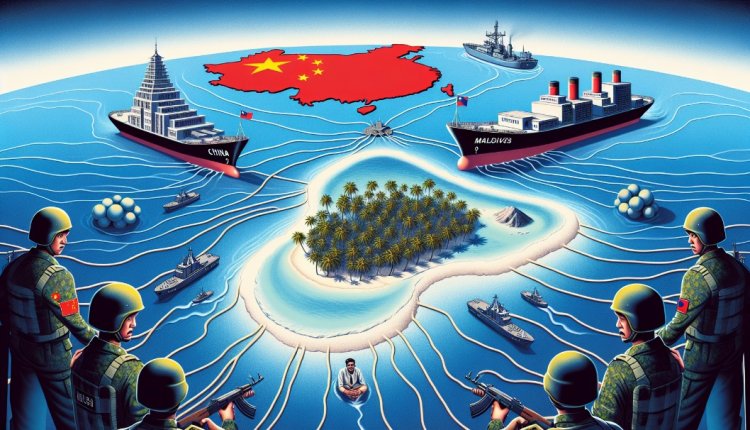The Geopolitics of China's Relations with the Maldives and Taiwan
Island Crossroads: Navigating the complex web of China's strategic dance with the Maldives and Taiwan. Unravel economic ties, geopolitical tensions, and diplomatic dilemmas in this Indian Ocean chessboard.

Introduction
There has been quite a flurry of diplomatic activity in the Maldives recently, as the country's president has sought to strengthen ties with China. While this move has caused a stir in the Indian subcontinent, it has also sparked outrage and frustration among social media users in India. Many are concerned about China's growing influence in the region and what this could mean for India's supply chains and security.
Meanwhile, tensions continue to simmer in Taiwan, where fears of an attack from Beijing have led to nationwide warnings and an increased military presence. With Taiwan's presidential elections looming, these concerns have taken on even greater significance. It is a critical time for the island nation as it struggles to find a balance between relations with China and asserting its autonomy.
These developments underscore the ongoing geopolitical struggle between China and its neighbouring countries, especially India and Taiwan. As China seeks to expand its influence, maintaining the balance of power in the region is becoming increasingly important for these countries.
But let's not forget the other important events happening around the world. France recently made history with the appointment of its youngest and first openly gay prime minister. Bhutan is battling high unemployment with elections, while Ecuador is struggling with a prison crisis that has led to a state of emergency being declared. And in Germany, farmers are protesting against diesel subsidies, while Norway is making plans to delve into the world of deep-sea mining.
This news is just a small slice of the diverse and ever-changing global landscape. So stay tuned for more on these and other important events around the world.
Geopolitics of China's Relations with the Maldives
China's relationship with the Maldives has important geopolitical implications, especially in the Indian Ocean. The Maldives' location is strategically important as it lies under a massive underwater ridge that forces ships to navigate certain routes north and south of the islands. This makes the Maldives an ideal location for trade and energy imports, including China's oil imports from West Asia. If China were to station warships or establish a military base in the Maldives, this could impact India's supply and security, as 50% of India's trade and 80% of its energy imports pass through these sea routes.
China's aim in forging closer ties with the Maldives is to win the country over to its side and increase its influence in the region. By becoming the Maldives' main development partner, China hopes to gain control and influence over the Maldives' strategic location. However, the large debt that the Maldives owes China carries risks and consequences. The Maldives' total debt amounts to almost 110% of its GDP, with a large part of this being owed to China. The country currently spends around USD 300 million annually on debt servicing, which is expected to rise to USD 1 billion by 2026. The Maldives' dwindling foreign exchange reserves and growing debt burden could lead to economic instability and dependence on China.
China's relationship with the Maldives has profound geopolitical implications. The Maldives' strategic location in the Indian Ocean makes it an extremely valuable location for trade and energy imports. China's goal is to win over the Maldives, and the Maldives' large debt to China poses risks and consequences for the economic stability of both India and the Maldives. Both countries need to carefully manage their relationship to ensure security and economic well-being in the region.
China's relations with Taiwan
The relationship between China and Taiwan has always been a sensitive issue. It all began during the Chinese Civil War, from which the Communist Party emerged victorious, prompting the Nationalist Party to withdraw to Taiwan and set up its own government.
China firmly believes that Taiwan is part of its territory and has repeatedly expressed its desire to reunite with the island. Taiwan, on the other hand, sees itself as a sovereign nation with its own government and military, separate from China. This issue has divided the international community: some countries recognise Taiwan as an independent state, while others adhere to the "one-China" policy and maintain diplomatic relations with China.
In recent years, China has been known to interfere in Taiwan's presidential elections to influence the outcome. They see a pro-Chinese leader in Taiwan as beneficial to their goal of reunification. China uses various tactics to influence the election, including economic pressure, cyberattacks, spreading disinformation, and diplomatic coercion on other countries not to support Taiwan.
One notable example of China's interference was the launch of a military satellite, which was seen as a show of force and a warning to Taiwan. This demonstration was intended to intimidate Taiwan and influence the election result.
China's actions have serious implications for Taiwan. Their military threats and intimidation jeopardise Taiwan's national security. Interfering in the elections undermines the democratic process and challenges Taiwan's sovereignty. Moreover, China's economic coercion can harm Taiwan's economy and affect trade and investment.
China's relationship with Taiwan is a complicated and contentious issue. The conflict has been going on for decades, and in recent years, China's interference in Taiwan's presidential elections has escalated. Its tactics, such as economic pressure and military demonstrations, have significant consequences for Taiwan's security and sovereignty. The international community must closely monitor and address this ongoing problem to ensure Taiwan's stability and well-being.
The Red Sea Conflict and India's Response
The ongoing conflict in the Red Sea, especially the Houthi attacks, has had a significant impact on India. India, a country heavily dependent on trade, especially with Europe, has seen an increase in trade costs due to the disruption of shipping. It is estimated that India's exports could fall by USD 30 billion this year due to the conflict.
To respond to this challenge, India has deployed various military assets to the region. These include warships, surveillance aircraft, drones, and naval commandos. Recently, the Indian Navy conducted a major operation to prevent a hijacking attempt off Somalia. These efforts are aimed at protecting Indian ships and safeguarding India's commercial interests in the Red Sea.
This conflict has also caused concern and reactions in other countries. Singapore, for example, has joined the US-led coalition in the region and will send soldiers to the Red Sea. Sri Lanka has also sent warships to patrol the Arabian Sea, while Pakistan has increased its naval presence in the area. This collective response underscores the importance of maintaining safe sea lanes in the Red Sea.
A resolution to the conflict in the Red Sea is critical to the security of these sea lanes and the uninterrupted flow of global trade. The international community must work together to address the root causes of the conflict and find a peaceful solution. Cooperation and diplomacy are key to ensuring the safe passage of ships and maintaining stability in the region. In this way, we can protect not only India’s interests but also those of countries around the world that rely on the Red Sea for their economic activities.
Bhutan's Election and Economic Challenges
Elections were recently held in Bhutan to address the pressing issue of high unemployment and economic challenges. The two major parties, the Bhutan Tendrel Party and the People's Democratic Party, promised during the election campaign to create more jobs and improve the economic stability of the country.
One of the biggest hurdles for Bhutan is youth unemployment, which stands at a worrying 29%. Many young Bhutanese struggle to find work and leave the country in search of better opportunities. This exodus is a major obstacle to Bhutan's economic development and future growth.
Bhutan is known for its unique approach to measuring development and prosperity—the concept of gross national happiness. While this perspective emphasises the importance of overall happiness and well-being, it has its limitations when it comes to addressing economic challenges. Bhutan needs to find a balance between prioritising happiness and meeting the economic needs of its people.
Resolving the border issue with China is another major challenge for Bhutan. The border dispute between Bhutan and China affects the security and economic stability of both countries. It is important for Bhutan to find a solution to protect its sovereignty and economic interests.
The election result in Bhutan also has implications for neighbouring countries, especially India and China. As Bhutan's closest ally, India has a strong interest in the country's political and economic stability. China, on the other hand, wants to expand its influence in the region and strengthen ties with Bhutan to gain a strategic advantage. The election result will undoubtedly have an impact on the dynamics between these two regional powers.
The election in Bhutan sheds light on the country's economic challenges, such as youth unemployment and the problem of emigration. It also raises pertinent questions about the limits of the concept of gross national happiness and the need to resolve the border issue with China. The impact of the election goes beyond Bhutan, as both India and China are watching the outcome closely. Bhutan needs to find solutions to its economic challenges to ensure the wellbeing of its people and overall stability in the region.
Ecuador's State of Emergency and Crime Wave
Ecuador is currently facing a serious crisis with rising crime rates and the control of prisons by criminal gangs. President Naboa has taken decisive action and declared a state of emergency to address this problem and protect the safety of the population.
One of the main concerns that led to the declaration of the state of emergency is the control that criminal gangs have over prisons. This allows them to carry out their illegal activities, such as drug trafficking, murder, and extortion, within the prison walls. It is alarming that gang leaders like Jose Adolfo Masia Vamar, also known as Feto, can exert such influence even behind bars.
The situation in Ecuadorian prisons has reached a critical point: inmates are taking control and even taking prison guards hostage. This is a clear sign that the government has lost control, and immediate measures must be taken to solve this problem. President Naboa's declaration of a state of emergency is intended to crack down on the criminal gangs and regain control of the prisons.
To this end, the government is deploying large numbers of police and military personnel to maintain order and track down gang members. Efforts are also being made to ensure the safety of prison guards and prevent further hostage-taking. However, tackling these criminal gangs is no easy task, as they have proven elusive and have escaped from prisons in the past.
The complex nature of these gangs and their strong influence within the prison system make it a challenge to completely disrupt their activities. It is vital that Ecuador addresses these issues effectively in order to restore stability, ensure public safety, and maintain the trust of its citizens.
The impact of the current state of emergency in Ecuador goes beyond public safety. The country's stability and governance are at stake as the government grapples with the challenges posed by criminal gangs. It is of the utmost importance that Ecuador take comprehensive measures to combat this crisis and restore law and order. Only then can the country move forward and provide its citizens with the security they deserve.
Norway's controversial Deep Sea Mining Proposal
Deep-sea mining is a complex and controversial practice that brings with it both potential benefits and major concerns. On the one hand, it promises access to valuable minerals and metals that are vital to various industries. On the other hand, the technical challenges and potential environmental damage cannot be overlooked.
The technical aspect of extracting minerals from the seabed at great depths is no easy task. It requires advanced machinery and robotics, and the technology is still under development. As there is little experience in deep-sea mining, it is important to ensure that the extraction techniques are efficient and sustainable.
Another major problem is environmental damage. The seabed is teeming with diverse marine ecosystems, and mining can disrupt and destroy these sensitive habitats. Sediments released during mining can suffocate marine organisms, while chemicals and noise pollution can further damage the environment. The potential impacts on marine life and biodiversity need to be thoroughly investigated and understood.
Despite the challenges, some countries, such as Norway, see deep-sea mining as an economic opportunity. They see it as a way to boost their economies and secure a share of the global supply of key minerals. However, the international community is divided on the issue and is calling for more research and stricter regulations before it can proceed.
To find a balance between economic benefits and environmental concerns, countries interested in deep-sea mining need to conduct comprehensive environmental assessments and invest in scientific research. International cooperation is also crucial for establishing guidelines and regulations that promote responsible and sustainable mining practices.
The decision to engage in deep-sea mining should not be taken lightly. It requires careful consideration of the potential impact on the environment and the value of the minerals extracted. By prioritising responsible and sustainable practices, we can ensure that deep-sea mining is carried out in a way that protects our oceans and preserves marine life for future generations.
The Decline of Public Libraries
Public libraries around the world are facing an uphill battle as they struggle with declining funding and closures. This problem is affecting communities around the world, including countries such as the UK, the US, and South Africa. Faced with limited financial support and budget cuts, libraries are struggling to keep their doors open and provide valuable resources to the public. This decline is having a significant impact on the accessibility of knowledge and the role that libraries play in society.
In the UK, almost 20% of libraries have closed in the last ten years, resulting in a staggering decline of over 100 million library visits. Budget cuts have forced libraries to reduce their opening hours or, in some unfortunate cases, close altogether. These closures not only limit access to books and resources but also deprive people of community spaces they rely on for education, research, and leisure activities.
The situation is similar in the US, where library visits have fallen by 31% in the last twenty years. As budget cuts lead to the closure of many public libraries, communities are left without vital resources and services. This decline is particularly detrimental to marginalised communities that have no alternative educational or cultural facilities.
With a high illiteracy rate and limited access to books, South Africa is struggling with its own reading crisis. In the last five years, 60 libraries have been forced to close, further exacerbating the problem. Without access to public libraries, many people, especially children, are unable to develop basic literacy skills and take advantage of educational opportunities.
Several factors are contributing to the decline of public libraries. One important factor is the rise of digital alternatives. With the rise of the internet and digital content, many people are using online platforms for information and entertainment. E-books, audiobooks, and online resources have become popular substitutes for physical books and traditional library services.
Another important factor is budget cuts. Public libraries are frequently among the first to experience funding reductions in times of financial austerity. This lack of financial support makes it difficult for libraries to maintain their operations, update their collections, and provide the necessary resources and programmes to their communities.
Despite these challenges, there are shining examples of library transformation and adaptation. Singapore, for example, has successfully transformed its libraries into modern, vibrant spaces that attract young visitors. Through the use of new technologies, meeting booths, and interactive elements, Singapore libraries have created a welcoming environment for learning, creativity, and community engagement.
It is important to recognise the importance of public libraries and the need for adaptation in these changing times. Libraries serve as gateways to knowledge and promote literacy, education, and cultural enrichment. They provide safe and inclusive spaces for people of all ages and backgrounds. To ensure the survival and relevance of public libraries, governments, communities, and individuals must advocate for increased funding, support innovative initiatives, and promote the value of libraries in the digital age.
Conclusion
To summarise, in this blog, we have discussed the complex geopolitical dynamics between China, the Maldives, and Taiwan and their implications for the rest of the world. We have highlighted the strategic importance of the Maldives in the Indian Ocean and explained how China's growing influence in the region could affect global power dynamics.
We also examined the ongoing tensions between China and Taiwan and shed light on the interference of Chinese influence in Taiwan's internal affairs, particularly during the presidential election. These dynamics highlight the challenges countries face in maintaining their sovereignty and security in the face of a rising China.
Understanding and analysing these geopolitical events is important for policymakers and individuals alike. It allows us to appreciate the complexity of international relations and anticipate the potential consequences of these dynamics for different regions and countries. By being informed about and engaging with these geopolitical events, we can make more informed decisions and navigate the interconnectedness of global events.
Going forward, it is important to consider the impact and possible future developments in the regions discussed. The ongoing geopolitical struggle between China and its neighbouring countries, including India and Taiwan, is likely to have a profound impact on regional security and economic stability. Countries need to manage their relations carefully and prioritise the welfare and security of their own nations.
These geopolitical dynamics highlight the interconnectedness of global events and emphasise the importance of a comprehensive understanding of the geopolitical landscape. By recognising the importance of analysing and understanding these dynamics, we can better navigate complex international relations and make informed decisions. To ensure the stability and prosperity of our interconnected world, it is crucial for policymakers and individuals to stay informed and engaged with global events.



 admin
admin 










